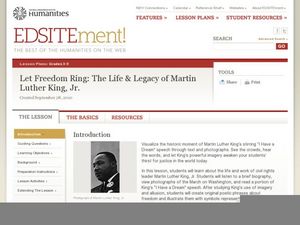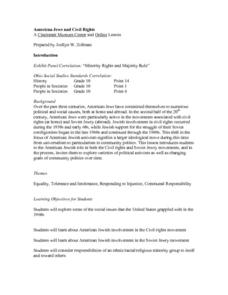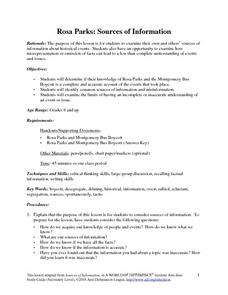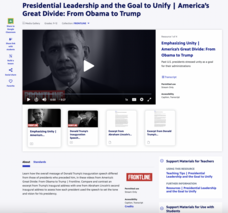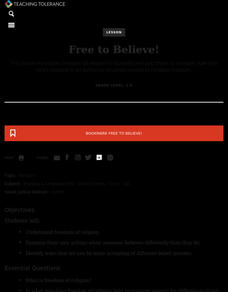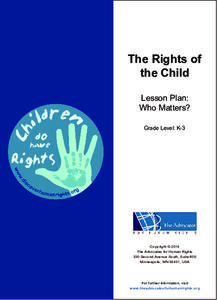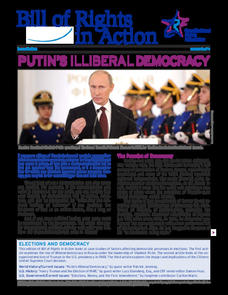Curated OER
Civil Rights in America
Seventh graders visit the Smithsonian and are shown different exhibits. They are to make their own drawing about one of the exhibits and write about the experience.
Curated OER
Argument in an Athenian Jail: Socrates and the Law
Students read and discuss Socrates's "Crito" and examine the arguments he made supporting his own death penalty. They consider the still-relevant debate between the rights of the individual and the rule of law.
Curated OER
Let Freedom Ring: The Life & Legacy of Martin Luther King, Jr.
Students use text and photos to visualize the delivery of Dr. Martin Luther King, Jr.'s historic "I Have A Dream" speech. They analyze Dr. King's speech for examples of imagery and allusion and create original poetry and illustrations...
Curated OER
Development of Federal Civil Rights Acts : 1950's - Present
Students use the Internet to research one of five cases associated with Brown v. Board of Education and then join a group with people who researched the other four.
Curated OER
Art: Faith Ringgold Story Quilts
Twelfth graders examine the impact of African American culture on the United States by inspecting Faith Ringgold's story quilts. Working in groups, they create a collective story quilt about current cultural issues. They research their...
Curated OER
American Jews and Civil Rights
Tenth graders examine the Civil Rights movement of the 1960's and how American Jews were involved. They discuss the responsibilities of any minority or ethnic group. They consider the process of change in politics as well.
Curated OER
Martin Luther King Jr. and Nonviolence
Using the book, Martin's Big Words, learners will discover the life of Dr. Martin Luther King Jr. Vocabulary is identified throughout the story by using several his famous protest speeches as examples. Class discussions on racism, during...
Anti-Defamation League
Rosa Parks: Sources of Information
Young scholars show what they know about Rosa Parks and the incident on one of the buses in Montgomery, Alabama. Groups discuss and identify where they receive most of their information. They examine the importance of having a complete...
Project Tahoe
Does the Use of Torture on Enemy Combatants Violate the 8th Amendment?
Tackle ethics in your high school history classes with a Socratic seminar about torture as a means for obtaining information. The plan allows for pupils to take the reins during the seminar. On the first day, class members read several...
K20 LEARN
Oklahoma and Segregation
It was not just the states of the Deep South that practiced segregation. Young historians investigate the history of segregation and desegregation in Oklahoma. They begin by reading, annotating, and analyzing an article about the impacts...
Center for History Education
Where Did Thomas Jefferson Stand on the Issue of Slavery?
Thomas Jefferson was a complicated man with a complex legacy. Middle schoolers examine a series of primary source documents to gather evidence for an essay in which they answer where Jefferson stood on the issue of slavery.
DocsTeach
"We Are Badly in Need of a Breath of Fresh Air": A Letter to President Kennedy About LGBTQ+ Rights
The 1960s were a pivotal time for many Americans who had long been discriminated against. Scholars read a document addressed to President Kennedy in support of LGBTQ+ rights and why they are essential. The activity includes group...
National Woman's History Museum
Eleanor Roosevelt: An Agent of Social Change
First ladies often take a back seat to their husbands' policies, but Eleanor Roosevelt broke that mold. Interested historians examine primary sources written by Roosevelt, including a speech and articles. Completing a round-robin of...
EngageNY
Identifying Theme: Connecting Passages from Esperanza Rising to Human Rights
Even fictional characters have rights. Scholars read selected passages from Pam Muñoz Ryan's Esperanza Rising and consider which of the five categories from the Universal Declaration of Human Rights the text relates to. They glue each...
EngageNY
Readers Theater and the UDHR
Let's make connections! Using the resource, class members make connections between the Universal Declaration of Human Rights and their readers theater scripts. To finish, they complete a worksheet to evaluate the role of narration in...
PBS
Presidential Leadership and the Goal to Unify | America’s Great Divide: From Obama to Trump
Traditionally, a United States President's Inaugural Address establishes the tone and vision for his presidency. It has stressed the goal to unify the country and bring the political parties together after what are often divisive...
Teaching Tolerance
Free to Believe!
The United States: One nation with countless religions. An interesting lesson focuses on the freedom of religion protected under the First Amendment. Academics learn why it is important to protect all religions, why there is a separation...
Teaching Tolerance
Dismantling Racial Caste
It's time to end racism. The final installment of the series encourages scholars to consider what is needed to ended the racial caste system in the U.S. Young historians complete group discussion, written prompt, and a hands-on-activity...
Teaching Tolerance
Understanding the Prison Label
Break the chain. An engaging lesson examines why it is so hard to break free of the prison system in the US. Academics participate in a reader's theater, read primary sources, and discuss their thoughts. The lesson explains the hardships...
Teaching Tolerance
Racial Disparity in the Criminal Justice System
Explore the impact of the war on drugs in a thought-provoking lesson for high school academics. Young historians delve into the world of the criminal justice system and the racial disparity that occurs in the US. The resource provides...
Facing History and Ourselves
Taking Ownership of the Law
The work of building and maintaining a democracy is, in the words of Justice William Hastie, "never finished." To better understand what Hastie sees as an ongoing building process, class members listen to a seven-minute podcast about two...
Facing History and Ourselves
Insights on Democracy from South Africa
As part of their study of democracy, high schoolers listen to a podcast featuring two South African educators and their efforts to support the process of transforming the nation from apartheid rule into a democracy. Learners also read...
Advocates for Human Rights
The Rights of the Child
Dr. Seuss wrote " A person's a person, no matter how small." The elementary resource uses Dr. Seuss's book Horton Hears a Who to explore children's rights in an engaging way. Young academics listen to the story, participate in group...
Constitutional Rights Foundation
Putin's Illiberal Democracy
Is Russia really a democracy? High school scholars explore Russian democracy under the leadership of President Putin. The resource provides opportunity for group discussion, writing, and research to understand Russia's political history,...




